Lemongrass Soda — A Reminder of Thailand
Several years ago, I went back home to Thailand with my partner, Charles. It was the first time in more than 30 years that I had gone there, and I was really looking forward to reconnecting with my relatives, the culture, my roots, and bringing back to life childhood memories of Bangkok that had begun to fade.
It was an amazing journey for me, and one that the scent of lemongrass always brings to mind.
When we landed in hot and humid Bangkok in the middle of the night, half asleep, dragging our luggage through Customs and trying to spot our driver in a crisp white uniform holding a sign with my name in English, we were worn out from our long journey. Once we were in the back seat of a gleaming black BMW sedan sent to fetch us by the Oriental Hotel, the driver handed each of us a sealed plastic bag containing a chilled wet washcloth. When we opened the bags and wiped our faces, we were enveloped in a wonderful aroma. I guessed that the towels were scented with lemongrass, but I asked the driver in Thai and he confirmed my suspicions. The driver told me my Thai was very good and asked how long since I had been back. I told him more than 30 years. He said, “Too long to be away from home.”
When we entered the Oriental Hotel, a huge flower arrangement in a fountain in the lobby was punctuated by a giant cluster of lemongrass, and its scent permeated the space. Needless to say, the Oriental’s famous service was flawless. By the time we had checked in and reached the elevator, an attendant knew which floor we were going to and pressed the button before we got in, holding the doors open and telling us that our luggage was already on its way.
The lobby of the Oriental Hotel, with lemongrass as the centerpiece of a floral arrangement in the fountain.
When we got to our floor, the bellman was waiting and guided us to our room, opening the door, showing us around and unloading our suitcases before leaving. I walked over to the window, pulled open the drapes, gazed at the lights of the city reflected on the surface of the Chao Phraya River, and thought to myself, I’m home at last. Tears were streaming down my face.
It seemed that our bed linens, soap and towels were all perfumed with lemongrass. I’ve grown up with lemongrass as an essential cooking ingredient in Thai food, but had never experienced it as an aroma used in perfume.
We spent the next few days sightseeing by riverboat around Bangkok, going to Wat Phra Keo (the Temple of the Emerald Buddha) at the Royal Palace, climbing the steps to the top of Wat Arun (the Temple of Dawn), browsing the bustling Chinatown market. Then we went to stay with my favorite uncle, Prarop, and his family. By this time, we had befriended the hotel driver who had picked us up at the airport and had taken us sightseeing on a daytrip to the floating market. We hired him during his off-duty hours to take us to Bang Pa-In Palace, the King’s winter palace, and Ayutthaya, one of Thailand’s ancient capitals. After touring most of Bang Pa-In Palace, we rested at a small lakefront visitor’s center, and while Charles was busy snapping photos of a cat asleep in a doorway, I purchased two sodas flavored with lemongrass. They were refreshing and delicious, just slightly sweet.
Lemongrass became the flavor and aroma that I would carry back to the U.S., and now it never ceases to remind me of home.
Lemongrass Soda
My recipe for lemongrass soda consists of making a simple syrup flavored with lemongrass, which can later be refrigerated and then mixed to your taste with sparkling water.
For the lemongrass syrup
- 4 cups (950 ml.) water
- 10 stalks of lemongrass, finely chopped and then pulverized in a food processor
- 4 cups (950 ml.) sugar
- In a saucepan, bring water to a boil and then turn heat to the lowest setting.
- Add sugar and stir until completely dissolved.
- Add the pulverized lemongrass and stir. Let steep over the lowest possible flame for 15 minutes.
- Turn off flame and let cool.
- Pour the contents of the saucepan through a wire-mesh strainer and into a jar, and discard the lemongrass pulp.
- Refrigerate the syrup until you’re ready to use it, then add a few tablespoons (about 45 ml.) to a glass filled with ice, add sparkling water and stir. Add more syrup to suit your taste for sweetness.
Enjoy!
— Vic
Read on for more about our trip to Thailand…
Rekindling memories of home
Sometimes leaving your country and your heritage isn’t your choice when your family emigrates to a new land. But the decision to learn about that heritage and re-experience childhood memories of your homeland certainly is. Understanding where you came from is an important part of understanding who you are.
When in Bangkok, riverboats make a convienient alternative to taxis and help you avoid the infamous congestion.
An adventure in eating
Some of my most vivid memories from my childhood in Thailand are of food and the markets. Reliving some of these memories during our trip made for some adventurous gastronomic experiences for my partner, who is usually game for anything.
Water spinach, fish cakes, shrimp balls, grilled freshwater prawns, salt-cured Chiang Mai pork, deep-fried candied land crab, blood clams, durian (probably the stinkiest food you ever turned your nose up at), jack fruit, longan, dragon fruit, rambhutan, tamarind candy, soursop, makrok, mongkut, chompoo, guava, and the list went on and on.
I think my memory of food and fruit is so vivid because it was my childhood escape while I was in boarding school in Thailand. All the kids were forced to eat together in the dining room at dinnertime and it was no fun. We each got a bowl of rice and then there were four or five dishes set before each table of 8 students and we would wrestle each other and grab what we could of our favorite dish.
Lunch was a different matter. We were each given some money and let out of the gates to roam the street vendors near our school and left to our own gastronomic devices.
Life floats by at a leisurely pace
About an hour outside of Bangkok in Damnuan Saduak is one of the famous floating markets, and what I saw took me back in time. Simple wood-framed homes lining the khlong, or canal, and people selling food, fruits and other items from their boats. The homes had windows without glass and their roofs were covered in tin.
When I saw older women paddling their vegetable- or fruit-laden boats, I wondered to myself how different life might have been for me if my mother didn’t marry an American and eventually move permanently to the U.S. in 1976.
I saw kids playing along the dock, splashing water at each other, and I tried to remember if my childhood in Thailand was that carefree.
I remember it was. But then it’s sometimes easier to remember the happy things when you’re a kid.
Charles and I enjoy refreshments while waiting for a long-tailed boat to take us on a tour of the floating market outside of Bangkok.
A fleet of long-tailed boats moored at the floating market. The boats get their nickname from the long propeller shaft on the rear-mounted engines.
Temple ruins and history in Ayutthaya
I wanted part of my journey home to focus on learning about Thai history. Because I left Thailand at such a young age, my memories of its history are hazy. One of our day trips from Bangkok served this purpose: A visit to Ayutthaya, Thailand’s second capital. Before the capital was moved to Bangkok, Ayutthaya was the capital until a war with neighboring Burma brought an army that overran the city and destroyed it.
We discovered that one of our favorite Thai beers, Chang (Elephant) Beer is made in Ayutthaya. Besides seeing the ruins in Ayutthaya, the trip also gave us a chance to see Bang Pa-In, or the Summer Palace, along the way.
A giant fig tree grows over a statue of Buddha at a temple ruin in Ayutthaya, one of Thailand's ancient capitals a few hours outside of Bangkok.
A view of the lake pavilion from the visitors' snack area at Bang Pa-In Palace, where we took a break and had a wonderful lemongrass soda.
A journey back in time
Like me, many of my Asian-American friends who were born in the U.S. or came when we were young, are journeying home. For my mother’s 70th birthday a couple of years ago, she wanted to go home, so my partner, Charles, and I made a gift of it for her.
Maybe it’s our version of a mid-life crisis.
I think with Mom and me, it’s wanting to reconnect with our memories. And not wanting to forget.
Some of the most vivid memories I have from my childhood are really just impressions, snapshots in time, smells, tastes.
While we travelled, I was tempted to stay behind the viewfinder of my camera but I’m afraid that by doing so, I was really missing out on the big picture and all of the feelings that go with it.
When I was in boarding school in Bangkok more than thirty years ago, I recall sleeping under mosquito nets, under ceiling fans. There was running water and plumbing at the boarding school, but the communal bathrooms consisted of large tiled rooms with drains in the middle and several huge onion-shaped earthen vessels filled with water and covered with a tin lid. On top of each lid were several tin bowls. To shower, we dipped a tin bowl into the vessels and poured it over ourselves. The school collected rainwater from all of the roofs and stored them in tanks. Someone would haul water from the tanks and fill the onion-shaped vessels in the showers every day.
On the train from Bangkok to Sukhothai, we saw simple wood-framed homes with rows of these onion-shaped vessels in the eaves of their roofs with drains directing rainwater into them. Even now, in the countryside, people are still collecting water the same way.
As a child, I recall our family’s visiting a distant relative in the south by train. The seats were benches made of wood and there was no air-conditioning or fans. Similar railcars are still used but now there are more modern options of air-conditioned railcars with sleeping compartments or air-conditioned railcars with reclining seats. This was what we chose.
In the past, when the train stopped at each station along the way, merchants with food and fruit piled high on top of trays perched on their heads would walk the tracks, selling them to passengers on the train. Now, we were served by an attendant who offered water, soft drinks, and a simple, hot, pre-packaged meal.
When we got off the train in Phitsunalok, after the 5-hour trip from Bangkok, we still needed to take a bus to Sukhothai. The non-airconditioned buses were old and packed and reminded me of the buses from my childhood, where people would crowd the aisles and spill out the doorways, hanging on for dear life as the drivers would careen down the roads.
At first we were directed to one of these buses and our suitcases were piled on board. Charles and I looked at each other, and I kept repeating “rot air” (air bus) to the attendant.
He ignored us, so we grabbed our suitcases and headed towards the ticket counter, where in my broken Thai I could more clearly communicate what we wanted. We were told it would be an hour wait or we could take the unair-conditioned bus that left in 10 minutes. We opted for the hour wait and then boarded an air-conditioned bus for Sukhothai.
When we got there, the driver was gracious enough to let us out in front of the guest house where we were staying. We were so exhausted from the day’s journey that all we could do was rest.
Immersed in history and rediscovering myself in Sukhothai
Sukhothai was the first capital of Thailand during about the 12th through the 14th centuries. The ancient city was abandoned after it was sacked by the Burmese, and the capital was moved to Ayutthaya, farther to the south.
We had decided only a week before leaving the U.S. that we would go to Sukhothai, and I’m glad we did.
Sukhothai has been designated a World Heritage Site by the United Nations and I can understand why. All of the ruins are splendid and I can only imagine what they must have been like in their time. While we were visiting the museum on a rainy day, I also learned that the first formalized written Thai language was developed in Sukhothai and it was an adaptation of Hindi script from India.
In the month before we left, Mom and I practiced my written Thai. I’m sure I misspelled a lot of things, but she really encouraged me. She’ll be going home again next year. I dream of going home again too.
One of the temple ruins at Sukhothai shows architecture similar to that of ancient temples in Cambodia.
Ruins of temple complexes are reflected in ponds and canals that dot Sukhothai, a United Nations World Heritage Site.
The ruin of Wat Chang or Elephant Temple at Sukhothai. The temple's chedi is surrounded by sculptures of elephants.
One of the reasons we wanted to visit Sukhothai was to see this temple ruin (Wat Sri Chum) that houses a giant statue of Buddha.
Charles and I laid water lilies at the statue as an offering of thanks. The fingers of the statue are covered by gold leaf placed by visitors. You can pay a small amount to a vendor outside the temple, who gives you a flower, incense and a small square of gold leaf that you can place on the buddha statue.
The mountians of northern Thailand
We ended our journey in Chiang Mai, the 2nd-largest city in Thailand. The lush mountains and cool climate reminded us a lot of Oregon. The pace of life here is much slower than that of Bangkok, but it’s still a popular tourist destination.
Many tourists use Chiang Mai as a starting point for treks into the mountains to see the lifestyle of hilltribes, or to see the region’s many national parks. The northern Thai word for mountain is Doi and one of the most famous is Doi Suthep, which is home to one of the region’s famous temples and the royal family’s winter palace.
In Chiang Mai, a northern provincial capital in Thailand, I negotiate with a tuk-tuk, a three-wheeled motorcycle taxi.
Category: Beverage
About the Author (Author Profile)
Victor Panichkul is a journalist and writer by training; a cook, wine lover and photographer by passion; and a lover of the outdoors since moving to Oregon more than 10 years ago. He is a native of Bangkok, Thailand.







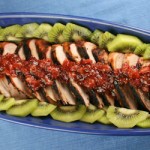
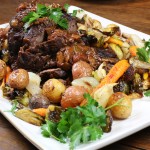
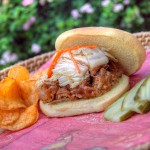



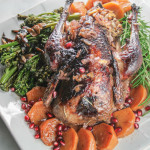
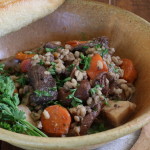
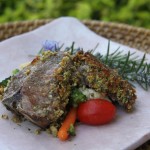
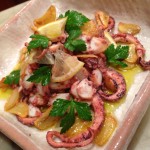
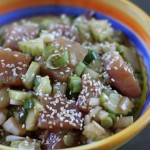




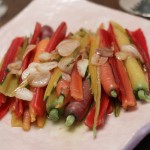
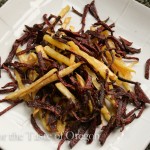


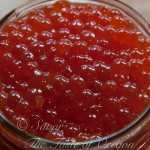
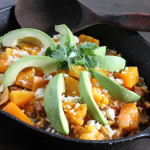
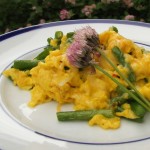
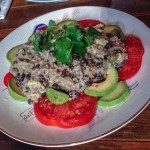

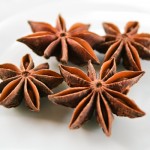
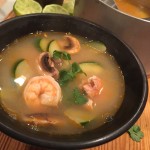
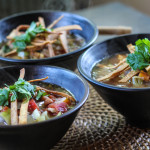

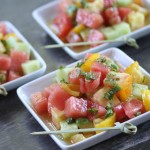


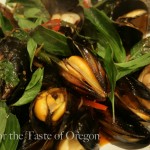
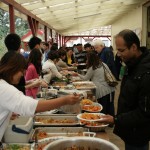




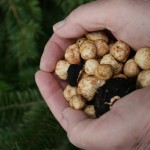

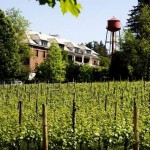

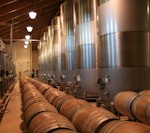
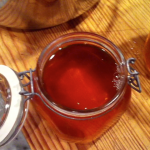
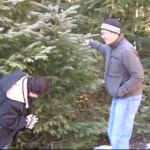

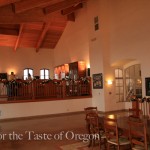


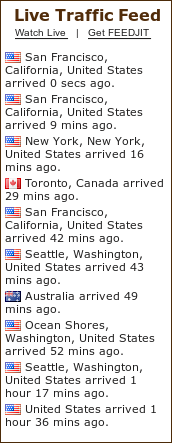

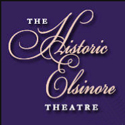


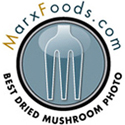
What wonderful pictures and commentary. Absolutely loved viewing. Thanks for sharing with us! (Smiles)
Shirley, thanks for your comment. I’m glad you enjoyed the photos and story of our trip.
Victor,
I had seem some of these pictures right after your trip, but I really enjoyed seeing them again. I am glad you got to go home, but also glad you came back. The lemongrass drink sonds very good.
Beautiful photos . I understand how you feel. My dad left thailand for 60 yrs and right till the day he passed away i could see how much he loved thailand and misses being home. Will be visiting thailand soon to catch up with uncle and cousins and i feel so so sad when i leave Bangkok cos its the place where my heart is and my roots are.
I have yet to make it to Thailand. But making this refreshing lemongrass soda is the next best thing to being there. At least for now! 😉
Bee, I’m so jealous that you’ll be visiting Thailand soon. Enjoy your trip! Thanks for reading and commenting on my blog.
— Vic
Carolyn, hope you enjoy the lemongrass soda. Thanks for reading and commenting.
— Vic
Vic - We’re out of lemongrass soda!
Amazing how smells can conjure a place, isn’t it. Enjoyed your journey - how great you were able to go back after so long.
[…] to stick with the clear, usually lemon-lime flavored ones. Following the directions I found online here, I followed his recipe exactly. It was pretty cut and dry, just food processing, boiling, straining […]
Greetings, Vic! Where in Portland would you best suggest we find great lemongrass (and other Thai ingredients)? Thank you!
Try Thai Lily Market. Lily Market
11001 NE Halsey Street
Portland, Oregon 97220
Phone: 503-255-0448
Fax: 503-255-1033